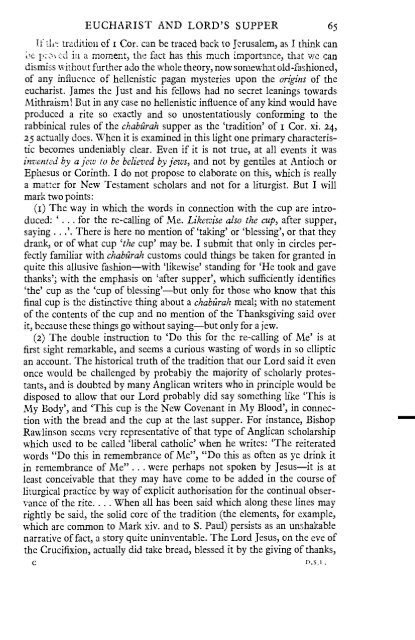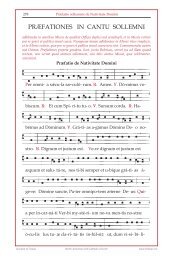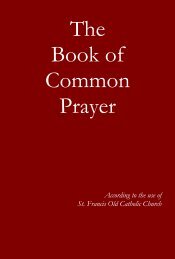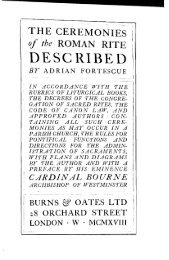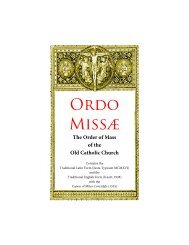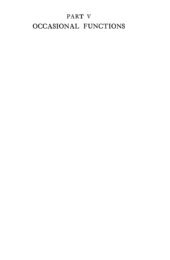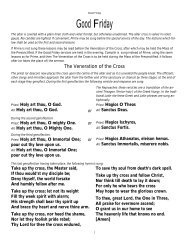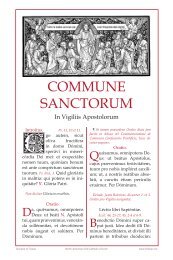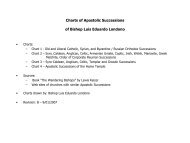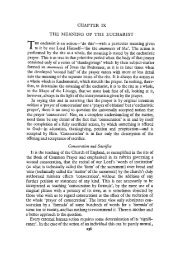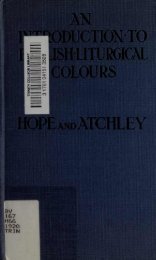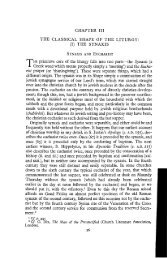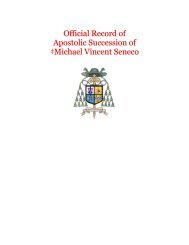Eucharist and Lord's Supper
Eucharist and Lord's Supper
Eucharist and Lord's Supper
Create successful ePaper yourself
Turn your PDF publications into a flip-book with our unique Google optimized e-Paper software.
EUCHARIST AND LORD'S SUPPER<br />
If ti,': tradition of I Cor. can be traced back to Jerusalem, as I think can<br />
llc proved in a moment, the fact has this much importance, that we can<br />
dismiss without further ado the whole theory, now somewhat old-fashioned,<br />
of any influence of hellenistic pagan mysteries upon the origins of the<br />
eucharist. James the Just <strong>and</strong> his fellows had no secret leanings towards<br />
Mithraism! But in any case no hellenistic influence of any kind would have<br />
produced a rite so exactly <strong>and</strong> so unostentatiously conforming to the<br />
rabbinical rules of the chaburah supper as the 'tradition' of 1 Cor. xi. 24,<br />
25 actually does. When it is examined in this light one primary characteristic<br />
becomes undeniably clear. Even if it is not true, at all events it was<br />
invented by a jew to be believed by jews, <strong>and</strong> not by gentiles at Antioch or<br />
Ephesus or Corinth. I do not propose to elaborate on this, which is really<br />
a matter for New Testament scholars <strong>and</strong> not for a liturgist. But I will<br />
mark two points:<br />
(1) The way in which the words in connection with the cup are introduced:<br />
' ... for the re-calling of Me. Likezoise also the cup, after supper,<br />
saying .. .'. There is here no mention of 'taking' or 'blessing', or that they<br />
drank, or of what cup 'the cup' may be. I submit that only in circles perfectly<br />
familiar with chabUrah customs could things be taken for granted in<br />
quite this allusive fashion-with 'likewise' st<strong>and</strong>ing for 'He took <strong>and</strong> gave<br />
thanks'; with the emphasis on 'after supper', which sufficiently identifies<br />
'the' cup as the 'cup of blessing'-but only for those who know that this<br />
final cup is the distinctive thing about a chabUrah meal; with no statement<br />
of the contents of the cup <strong>and</strong> no mention of the Thanksgiving said over<br />
it, because these things go without saying-but only for a jew.<br />
(2) The double instruction to 'Do this for the re-calling of Me' is at<br />
first sight remarkable, <strong>and</strong> seems a curious wasting of words in so elliptic<br />
an account. The historical truth of the tradition that our Lord said it even<br />
once would be challenged by probably the majority of scholarly protestants,<br />
<strong>and</strong> is doubted by many Anglican writers who in principle would be<br />
disposed to allow that our Lord probably did say something like 'This is<br />
My Body', <strong>and</strong> 'This cup is the New Covenant in My Blood', in connection<br />
with the bread <strong>and</strong> the cup at the last supper. For instance, Bishop<br />
Rawlinson seems very representative of that type of Anglican scholarship<br />
which used to be called 'liberal catholic' when he writes: 'The reiterated<br />
words "Do this in remembrance of Me", "Do this as often as ye drink it<br />
in remembrance of Me" ... were perhaps not spoken by Jesus-it is at<br />
least conceivable that they may have come to be added in the course of<br />
liturgical practice by way of explicit authorisation for the continual observance<br />
of the rite.... When all has been said which along these lines may<br />
rightly be said, the solid core of the tradition (the elements, for example,<br />
which are common to Mark xiv. <strong>and</strong> to S. Paul) persists as an unshakable<br />
narrative offact, a story quite uninventable. The Lord Jesus, on the eve of<br />
the Crucifixion, actually did take bread, blessed it by the giving of thanks,<br />
c<br />
D.S.1.


